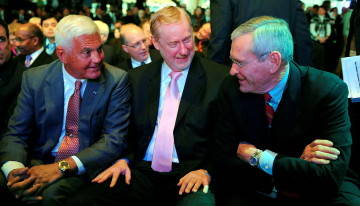GM's Post-Lutz Planning Reshuffle: Fewer Reviews, More Market Research
Doubtless somewhat shocked and surprised about GM Chairman/CEO/Non-Car-Guy Ed Whitacre’s decision to take over product planning responsibilities, Automotive News [sub] did some digging into the decision, and offers a full report. According to AN’s GM sources, the decision comes down to one fundamental goal: holding lower-tier executives accountable for decision making. By reducing executive reviews of forthcoming vehicles by one third, or about four times per development cycle, lower-level executives and engineers will have more freedom to make decisions, and will spend more time developing and less time preparing data for executive reviews. And lest you think this decision doesn’t merit your attention, consider this: though GM’s bureaucracy had created incredibly long lead times, most automakers hold about ten executive reviews per new product. By cutting to four, GM is taking something of a step into the unknown.
They’re trusting the troops below to do the right thing and check in less often
So says former mid- and full-size sedan (currently compact car) supremo Jim Federico, who is clearly a poster boy for this reform. Having spent years in Opel’s headquarters developing the Epsilon II chassis and its various applications, Federico has the kind of hands-on development experience that the new reform seeks to leverage. But, as examples from the Chrysler Airflow to the VW Phaeton prove, simply giving engineers free reign doesn’t always yield vehicles that sell well. And with executives in charge of GM’s business plan checking in on new vehicles less often, how are the newly-empowered engineers and development leads supposed to check their work against the market?
The answer, in a nutshell: Market Research. Having binged on market research-driven development during the Zarella era, GM had moved away from relying on focus groups and survey results under the leadership of Bob Lutz. Lutz was notoriously dismissive of market research, for the simple reason that Lutz knew a good car when he saw one. And if you’re never wrong, who needs to listen to the consumers? Besides, the Lutz school of thought was that a designer’s instincts produced better cars than all the market research in the world. As AN [sub] details, all that is changing now that Lutz is gone.
The now-retired vice chairman brought product planning, which includes market research, under the purview of product development.
In contrast, Whitacre has added new-product planning head Steve Carlisle to his list of direct reports, which raises questions about the role of research in product decisions.
In short, Whitacre trusts GM’s engineers to execute new products more than he trusts GM’s designers to dream up the cars that the market doesn’t know it wants yet. Whitacre will arm himself with a steady flow of market research and guide planning from a distance, instead of getting personally involved in the technical aspects of development the way Lutz would. The major worry here: GM’s cars were undeniably improved by Lutz’s hands-on approach, which was itself a reaction to the intensely mediocre products created by Zarella’s market research-driven development process. With a non-car guy calling the planning shots based on the latest focus group numbers, GM runs the risk of devolving into Malibu Maxx-era dissipation. On the other hand, engineers like Federico have experienced the successes (and failures) of the Lutz Way, and are, in theory, acting like hundreds of mini-Lutzes, obsessing over the details and execution of every new product.
Lutz’s influence on GM’s recent products helped set the stage for a reborn General Motors, but one generation of vehicles can’t undo decades of decline. GM’s new product development approach will have to build relentlessly on recent improvements if it wants its consumer reputation to eventually match the quality of its products.
More by Edward Niedermeyer
Latest Car Reviews
Read moreLatest Product Reviews
Read moreRecent Comments
- Jalop1991 In a manner similar to PHEV being the correct answer, I declare RPVs to be the correct answer here.We're doing it with certain aircraft; why not with cars on the ground, using hardware and tools like Telsa's "FSD" or GM's "SuperCruise" as the base?Take the local Uber driver out of the car, and put him in a professional centralized environment from where he drives me around. The system and the individual car can have awareness as well as gates, but he's responsible for the driving.Put the tech into my car, and let me buy it as needed. I need someone else to drive me home; hit the button and voila, I've hired a driver for the moment. I don't want to drive 11 hours to my vacation spot; hire the remote pilot for that. When I get there, I have my car and he's still at his normal location, piloting cars for other people.The system would allow for driver rest period, like what's required for truckers, so I might end up with multiple people driving me to the coast. I don't care. And they don't have to be physically with me, therefore they can be way cheaper.Charge taxi-type per-mile rates. For long drives, offer per-trip rates. Offer subscriptions, including miles/hours. Whatever.(And for grins, dress the remote pilots all as Johnnie.)Start this out with big rigs. Take the trucker away from the long haul driving, and let him be there for emergencies and the short haul parts of the trip.And in a manner similar to PHEVs being discredited, I fully expect to be razzed for this brilliant idea (not unlike how Alan Kay wasn't recognized until many many years later for his Dynabook vision).
- B-BodyBuick84 Not afraid of AV's as I highly doubt they will ever be %100 viable for our roads. Stop-and-go downtown city or rush hour highway traffic? I can see that, but otherwise there's simply too many variables. Bad weather conditions, faded road lines or markings, reflective surfaces with glare, etc. There's also the issue of cultural norms. About a decade ago there was actually an online test called 'The Morality Machine' one could do online where you were in control of an AV and choose what action to take when a crash was inevitable. I think something like 2.5 million people across the world participated? For example, do you hit and most likely kill the elderly couple strolling across the crosswalk or crash the vehicle into a cement barrier and almost certainly cause the death of the vehicle occupants? What if it's a parent and child? In N. America 98% of people choose to hit the elderly couple and save themselves while in Asia, the exact opposite happened where 98% choose to hit the parent and child. Why? Cultural differences. Asia puts a lot of emphasis on respecting their elderly while N. America has a culture of 'save/ protect the children'. Are these AV's going to respect that culture? Is a VW Jetta or Buick Envision AV going to have different programming depending on whether it's sold in Canada or Taiwan? how's that going to effect legislation and legal battles when a crash inevitibly does happen? These are the true barriers to mass AV adoption, and in the 10 years since that test came out, there has been zero answers or progress on this matter. So no, I'm not afraid of AV's simply because with the exception of a few specific situations, most avenues are going to prove to be a dead-end for automakers.
- Mike Bradley Autonomous cars were developed in Silicon Valley. For new products there, the standard business plan is to put a barely-functioning product on the market right away and wait for the early-adopter customers to find the flaws. That's exactly what's happened. Detroit's plan is pretty much the opposite, but Detroit isn't developing this product. That's why dealers, for instance, haven't been trained in the cars.
- Dartman https://apnews.com/article/artificial-intelligence-fighter-jets-air-force-6a1100c96a73ca9b7f41cbd6a2753fdaAutonomous/Ai is here now. The question is implementation and acceptance.
- FreedMike If Dodge were smart - and I don't think they are - they'd spend their money refreshing and reworking the Durango (which I think is entering model year 3,221), versus going down the same "stuff 'em full of motor and give 'em cool new paint options" path. That's the approach they used with the Charger and Challenger, and both those models are dead. The Durango is still a strong product in a strong market; why not keep it fresher?


































Comments
Join the conversation
I still don't understand why the Malibu Maxx is so unloved. While it's not a great car, it is a pretty good one with a lot of practical functionality. My wife, sister-in-law and niece all drive them and are very happy with the styling, but they really like the versatility. I even see echoes of the Avanti in the profile view. I know that they didn't sell well, but I thought that was more the result of Chevy not knowing how to market them, plus the fact that the sedan version was pretty lame.
doesn't matter who's in charge, make it beautiful and it will sell.